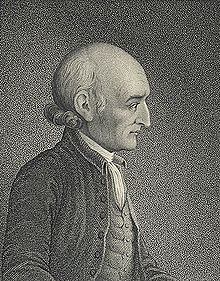George Wythe | |
|---|---|
 | |
| Delegate from Virginia to the Continental Congress | |
| In office June 1775 – June 1776 | |
| Attorney General of Virginia | |
| In office January 29, 1754 – February 10, 1755 | |
| Preceded by | Peyton Randolph |
| Succeeded by | Peyton Randolph |
| In office November 22, 1766 – June 11, 1767 | |
| Preceded by | Peyton Randolph |
| Succeeded by | John Randolph |
| Speaker of the Virginia House of Delegates | |
| In office 1777–1778 | |
| Preceded by | Edmund Pendleton |
| Succeeded by | Benjamin Harrison V |
| Mayor of Williamsburg, Virginia | |
| In office 1768–1769 | |
| Preceded by | James Cocke |
| Succeeded by | John Blair Jr. |
| Personal details | |
| Born | 1726 Chesterville, Virginia, British America |
| Died | June 8, 1806 (aged 79–80) Richmond, Virginia, U.S. |
| Resting place | St. John's Episcopal Church |
| Political party | Federalist |
| Education | College of William and Mary (BA) |
| Signature | |
George Wythe (/wɪθ/; 1726 – June 8, 1806)[1][2] was an American academic, scholar, and judge who was one of the Founding Fathers of the United States. The first of the seven signatories of the United States Declaration of Independence from Virginia, Wythe served as one of Virginia's representatives to the Continental Congress and the Philadelphia Convention and served on a committee that established the convention's rules and procedures. He left the convention before signing the United States Constitution to tend to his dying wife. He was elected to the Virginia Ratifying Convention and helped ensure that his home state ratified the Constitution.[3] Wythe taught and was a mentor to Thomas Jefferson, John Marshall, Henry Clay and other men who became American leaders.
Born into a wealthy Virginia planter family, Wythe established a legal career in Williamsburg, Virginia, after studying under his uncle. He became a member of the House of Burgesses in 1754 and helped oversee defense expenditures during the French and Indian War. He opposed the Stamp Act of 1765 and other British taxes imposed on the Thirteen Colonies. He was also a delegate to Virginia's 1776 constitutional convention and helped design the Seal of Virginia. Wythe served as a judge for much of his life, first as a justice of the peace and then on the Virginia Court of Chancery. He was also a prominent law professor at the College of William & Mary and took on several notable apprentices. He remained remarkably close to Jefferson and left Jefferson his substantial book collection in his will. Wythe became increasingly troubled by slavery and emancipated all of the people he had enslaved at the end of the American Revolution.[4][5] Wythe died in 1806, apparently from poisoning, and his grand-nephew George Sweeny was tried and acquitted for Wythe's murder.
- ^ Wythe's exact date of birth is not known. Hemphill, William Edwin, "George Wythe the Colonial Briton: A Biographical Study of the Pre-Revolutionary Era in Virginia," PhD diss., University of Virginia, 1937, 31.
- ^ Tyler, Lyon G., "Ancestry of George Wythe, LL. D.," William and Mary College Quarterly 2, no. 1 (July 1893), 69. Wythepedia. Retrieved January 20, 2022.
- ^ usconstitution.net Notes on the Constitution, U.S. Constitution
- ^ Virginia's Attitude Toward Slavery and Secession By Beverley Bland Munford pg. 102
- ^ Munford, Beverley Bland (1914). Virginia's Attitude Toward Slavery and Secession - Beverley Bland Munford - Google Books. L.H. Jenkins, Edition Book Manufactures. ISBN 9780722298015. Retrieved 2022-09-14.